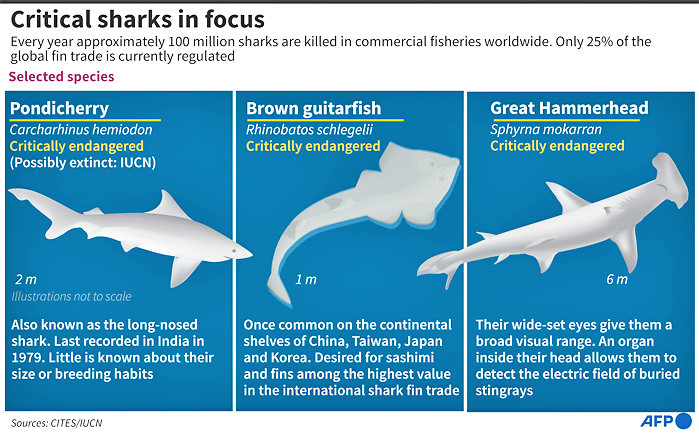PANAMA CITY (AFP) – Delegates at a global summit on trade in endangered species have postponed a vote on whether to approve a proposal to protect sharks, a move that could drastically reduce the lucrative and often cruel shark fin trade.
The proposal would place dozens of species of the requiem shark and the hammerhead shark families on Appendix II of the Convention on International Trade in Endangered Species (CITES).
The appendix lists species that may not yet be threatened with extinction but may become so unless trade in them is closely controlled.
If the plenary meeting gives the green light, “it would be a historic decision”, Panamanian delegate Shirley Binder, who presided over the meeting, told AFP.
“For the first time CITES would be handling a very large number of shark species, which would be approximately 90 per cent of the market,” she said.
Although a vote had been expected on Thursday, Binder suspended the session, as debate over the hippo trade between the European Union (EU) and African countries dragged on.
Insatiable appetite in Asia for shark fins spurred their trade.

Despite being described as almost tasteless and gelatinous, shark fin soup is viewed as a delicacy and is enjoyed by the very wealthy, often at weddings and expensive banquets.
Shark fins, representing a market of about USD500 million per year, can sell for about USD1,000 a kilogramme.
Sharks have long been seen as the villain of the seas they have occupied for over 400 million years, drawing horror with their depiction in films such as Jaws, and occasional attacks on humans.
However, these ancient predators have undergone an image makeover in recent years as conservationists highlighted the crucial role they play in regulating the ocean ecosystem.
According to the Pew Environment Group, between 63 million and 273 million sharks are killed every year, mainly for their fins and other parts.
With many shark species taking over 10 years to reach sexual maturity, and having a low fertility rate, the constant hunting of the species has decimated their numbers.
In many parts of the world, fisherman lop the shark’s fins off at sea, tossing the shark back into the ocean for a cruel death by suffocation or blood loss.
The efforts by conservationists led to a turning point in 2013, when CITES imposed the first trade restrictions on some shark species.
“We are in the middle of a very large shark extinction crisis,” director of shark protection for the NGO Wildlife Conservation Society (WCS) Luke Warwick told AFP at the beginning of the summit.
During hours-long fierce debate on Thursday, Japan and Peru sought to reduce the number of shark species that would be protected.
Japan proposed that the trade restriction be reduced to 19 species of requiem sharks, and Peru called for the blue shark to be removed from the list. However, both suggestions were rejected.
“We hope that nothing extraordinary happens and that these entire families of sharks are ratified for inclusion in Annex II,” Chilean delegate Ricardo Saez told AFP.
Several delegations, including hosts Panama, displayed stuffed toy sharks on their tables during the earlier Committee I debate.





